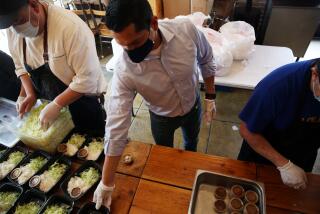Sharing space, then lives
Jackie Praskin, 83, petite, alert as a finch and a C-SPAN junkie, shared her North Hollywood home for nearly two years with Paval Vinokuroz, 58, a Ukrainian immigrant who ignored headlines to play computer games.
Yet somehow they clicked.
At first their relationship was all business, a way for Jackie to get help with household tasks and to feel less lonely. But after a year or so, Jackie began to view the snowy-haired Paval as a son.
Paval, too, grew fond of Jackie. That’s why he stayed around when things got difficult.
As Jackie became increasingly frail, Paval took on nursing duties, eventually helping her with basics such as bathing, taking medicines and getting in and out of bed.
It wasn’t what he signed up for when he wandered into the West Hollywood storefront of a group that matches seniors with roommates. But in the end, he, too, benefited in a way he didn’t expect.
“I didn’t ask for this,” Paval said recently. “But life is an unpredictable thing.”
The two were brought together by Alternative Living for the Aging, a nonprofit group that has matched more than 7,000 seniors with roommates over the last three decades.
Advocates say that with careful screening and organized support, home-sharing can be an attractive option for aging people who wish to continue living independently.
The arrangement is becoming widespread, said Janet Witkin, executive director of Alternative Living for the Aging, because of two demographic realities: a larger aged population and a growing number of younger people who can’t afford soaring rents.
In the Los Angeles area average rent is $1,700, Witkin noted.
“There are hundreds of empty bedrooms out there,” she said. “And there are a lot of these other people who need housing.”
Jackie and Paval had something to offer each other.
Jackie was looking for companionship as well as someone who could run to the grocery store and take her Maltese-poodle mix, Beau, for his twice-daily walk.
Vinokuroz needed a roof over his head. He was living out of his car in Los Angeles while working as a medical-transport driver. He couldn’t afford an apartment.
Jackie was initially matched with a woman in her late 50’s. But it didn’t work out, she said, because the woman didn’t offer much companionship.
Paval arrived in late 2005.
“We disagree on a lot,” Jackie said last spring, sitting on the edge of a sofa in her spotless home, back erect and hands folded in her lap. “But we support each other.”
Their example is one of many different house-sharing arrangements. Older single women are renting and, sometimes buying, property together, according to an article, “The New Housemates,” in the July issue of AARP’s magazine. Others offer a room rent-free in return for making meals and doing light housekeeping. Some charge rent and expect little from their tenant in return.
Whatever the goal -- extra income, care-giving or just companionship -- roles and expectations of each should be clearly spelled out, advocates say.
At Alternative Living for the Aging, the process begins with interviews of both homeowner and potential tenant. The agency checks references. “Our staff asks: ‘Would I want my beloved mom with this person?’ ” Witkin said.
Misfires happen. In 2006, 24% of the matches lasted less than six months, she said. But if both sides agree to a trial arrangement and are flexible, they can usually work things out.
Successful applicants are invited to a variant of speed-dating. On Fridays, in a large room at the Alternative Living headquarters, homeowners and potential tenants rotate around, interviewing each other to see if there’s a connection.
Witkin said older women often request other senior women. But the genders can also mix quite well, she said.
That was the case for Jackie and Paval. Jackie had been living alone in the tidy post-World War II tract home where she and her husband, Robert, had raised their three children.
Jackie didn’t want to leave. She had a circle of friends and was active in political causes in the San Fernando Valley. She was comfortable in the home she and Robert had created, and memories filled every room.
Before they retired, Robert had been a photographer for the city of Los Angeles, and Jackie had worked as a reservation clerk for now-defunct airline TWA. Together, they had traveled the world.
In a wood-paneled den that Robert built himself, the adventures of their youth are captured in numerous black-and-white photographs, this one showing a stylish young Jackie on the Great Wall of China, that one depicting a handsome dark-haired Robert in an exotic locale.
“How can I leave this?” she asked as she entered the den, tears filling her eyes. “When I walk in here, he’s here.”
There was another reason.
Robert had died of cancer, and spent his final days in a nursing home. Jackie had detested the institutional setting. She wanted to avoid that for herself if possible, she said.
Paval had spotted Jackie sitting primly at one of the Friday gatherings.
“She was a nice lady, sitting quietly,” he recalled. “She looked lonely.”
They started talking and, after several phone conversations, agreed to try out the arrangement. Within a year, they had settled into a comfortable give and take.
Paval lived rent-free and helped Jackie cook, clean, shop. He took her to political events, watching in amusement from the side. They went on jaunts, once joining friends for a trip to Ventura’s coast when Jackie was still able to walk.
They disagreed over little things, like what Jackie’s dog would eat and how often Paval would take Beau for a walk. They agreed that Paval is the better cook and that they shouldn’t discuss religion.
“He really believes in God and my mom was a staunch atheist,” said Tony Praskin, one of Jackie’s two sons. “They didn’t really see eye to eye. But a stimulating life is better than an empty life.”
Tony Praskin visited his mother frequently and said he didn’t have a great concern about letting a stranger into her house. Friends warned that Paval could be a gold digger. But Praskin said he proved to be a lifesaver.
“He’s not the most patient person, but she wasn’t the most easy person to deal with either,” he said. “I think she’s damned lucky to have had Paval.”
Jackie was healthy enough to receive visitors earlier this year. But by July, just a few months later, her health began to deteriorate rapidly. She became virtually bedridden.
Paval remained at her side, making her meals, helping her bathe and taking her for twice-monthly shots to build her blood cells back up. That he chose to do so is unusual, said Witkin, the Alternative Living director.
“Not a lot of people do that. It usually falls back on the family,” she said. “But those who stay do it because they’ve formed a real bond.”
Paval knew how much Jackie feared going to a nursing home, and at some point during their time together he had promised her that he would stay to the end.
It became more than a commitment to the feisty Jackie, whose passionate intellect he had come to admire. It was penance. Paval said he had left his own mother behind years earlier in Odessa, a bustling port city on the Black Sea.
Life in the United States had been hard after he left the Ukraine in 1990, he said. He drifted from one job to another, working as a carpenter, a house painter, a gas station attendant. Paval said he was unable to get back to his native country for 10 years, and during that time his mother died. Now here he was with Jackie, in her final days.
“I feel some guilt, and I pay back with Jackie,” Paval said with a shrug. “This is how it works for me.”
Paval was in Jackie’s home on the early summer evening in July when the elderly woman asked to listen to some music. After a while, Paval made her a light meal, which she ate in bed, and she drifted off to sleep, he said.
Later that night, when he came back in to check on her, his friend had passed away. It was a sad night, he said, but a promise kept.
“She died in her sleep, at home,” Paval said. “Just like she wanted.”
Jackie’s family let Paval stay in her house until it sold. He has since moved in with friends while he looks for another senior roommate.
In her will, Jackie directed that Paval receive $25,000 and her 2000 Honda Civic. Paval had one request of Jackie’s children: He wanted to keep Beau. The family agreed.
catherine.saillant@latimes.com
The phone number for Alternative Living for the Aging is (323) 650-7988.
More to Read
Start your day right
Sign up for Essential California for news, features and recommendations from the L.A. Times and beyond in your inbox six days a week.
You may occasionally receive promotional content from the Los Angeles Times.







